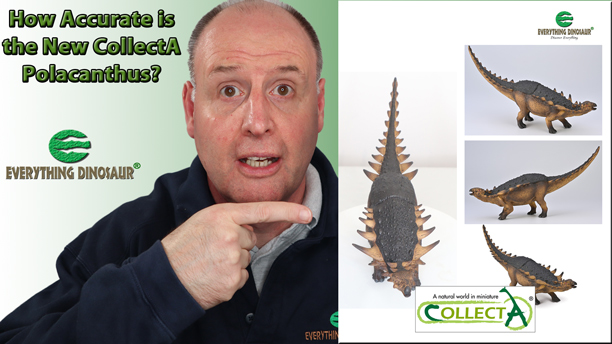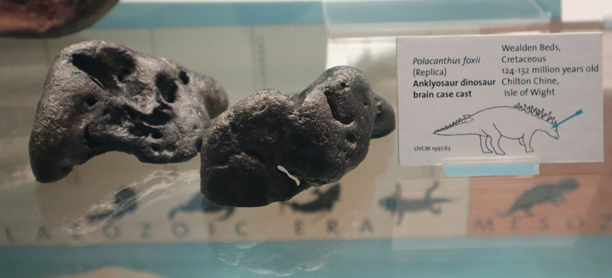New CollectA Polacanthus YouTube Video Nears Completion
The new CollectA Polacanthus YouTube video is nearly complete. This video review will examine how accurately the model reflects the known fossil material. A review of armoured dinosaur fossil specimens associated with the Wealden Group is continuing. Isolated dermal armour fossils from southern England and the Isle of Wight may not necessarily represent the Polacanthus taxon. With the arrival of a new CollectA Polacanthus figure this year, team members have taken the opportunity to create a short YouTube video outlining the changing perceptions regarding Polacanthus foxii.

How accurate is the new for 2024 CollectA Polacanthus? In a new video Everything Dinosaur team members take a look at the science behind this new CollectA Deluxe scale model. Picture credit: Everything Dinosaur.
Picture credit: Everything Dinosaur
Reviewing the CollectA Polacanthus
Everything Dinosaur were fortunate to be sent an early prototype of the figure. This figure has been used in our video review. It is a 3D print, and it has been painted in accordance with the production figure’s approved colour scheme. However, it is approximately the same size as the production model, albeit the model has two drainage holes located on its underside.
To view the current range of CollectA Deluxe prehistoric animal figures in stock: CollectA Prehistoric Animal Scale Models.
A spokesperson explained that as the material representing members of the Thyreophora was being reviewed, so it was likely that more taxa of British armoured dinosaurs would be erected. The spokesperson outlined that the Thyreophora was a clade. It consists of ornithischian armoured dinosaurs. To date, three armoured dinosaur taxa are associated with the Wealden Group, these dinosaurs are:
- Hylaeosaurus (H. armatus) named by Mantell in 1833.
- Polacanthus (P. foxii) named in 1865.
- Vectipelta (V. barretti) named in 2023.
To read Everything Dinosaur’s blog post about the scientific description of Vectipelta barretti: Vectipelta Honours Natural History Museum Palaeontologist.

Fragmentary and eroded armoured dinosaur fossils on display at Liverpool Museum. These fossils have been assigned to Polacanthus foxii. However, palaeontologists have become less confident over assigning armoured dinosaur fossils from the Wealden Group to a specific taxon. Picture credit: Everything Dinosaur.
Picture credit: Everything Dinosaur
Completing the CollectA Deluxe Polacanthus Video
The video consists of several pieces of narration including a short segment that explains the history of Polacanthus research. In addition, the video highlights some of the confusing perceptions that arose following the first scientific reconstruction of Polacanthus in 1905 (Nopcsa). Fortunately, the review of the figure has been concluded. This section has proved to be the most difficult part of the video to create. The work entailed undertaking an examination of the CollectA model and comparing it to the holotype fossil material.
The CollectA Polacanthus YouTube video review should be live on Everything Dinosaur’s YouTube site in a few days.
Visit the Everything Dinosaur website: Dinosaur Toys and Models.
To visit Everything Dinosaur’s YouTube channel: Everything Dinosaur’s YouTube Channel.

